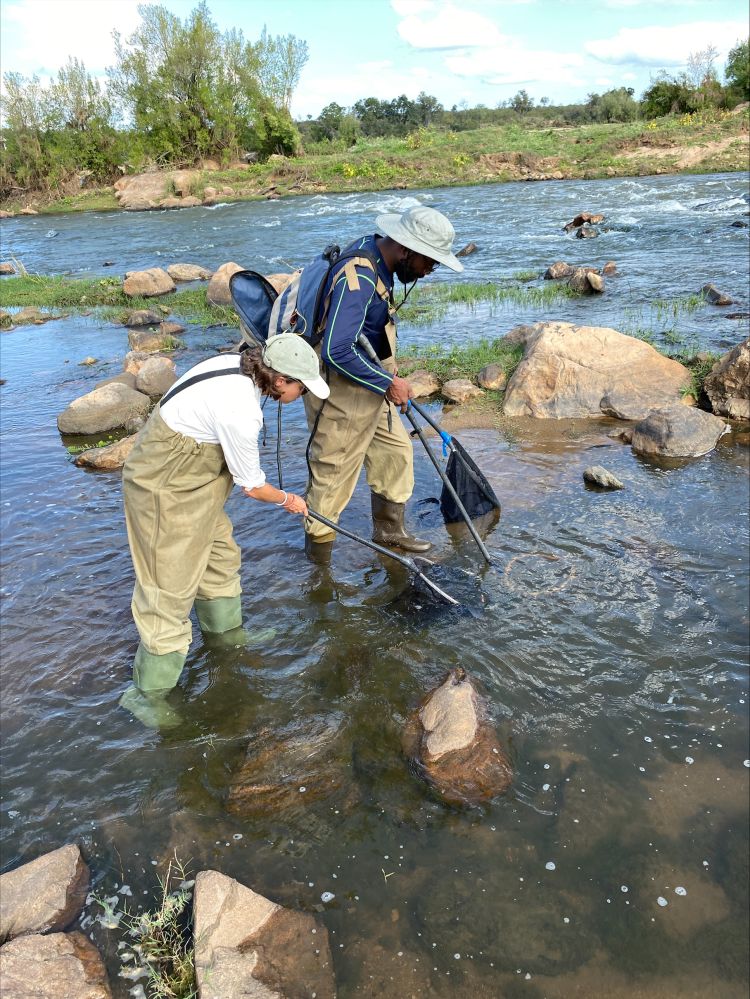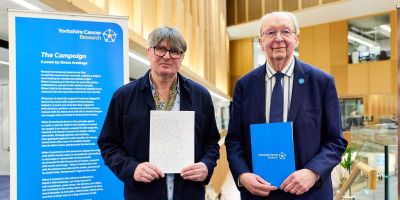‘Open Africa, Open World’: The Faculty of Biological Sciences celebrates Africa Week 2024

The Faculty of Biological Sciences join the University in celebrating the strengths, diversity and impact of African scholars, organisations and partnerships.
For many years, Africa has been open to the world, freely sharing its knowledge and resources. The geo-political North has not been as generous in return.
Africa Week gives us the opportunity to begin to redress that. We’re looking forward to seeing how radical collaboration can help us share ideas, learn together, and ultimately make a difference.
Africa Week is one part of the wider University International Strategy and Africa Strategy aimed at creating global partnerships that provide international learning and research opportunities.
Our international strategy is about delivering shared projects that address global challenges, reduce inequality and develop excellent graduates who, as engaged global citizens, will be well equipped to make a positive difference in the world.
Here’s how our partnerships with African institutions and networks are helping us do it.
How drought affects crop production and nutrition in Africa
Sibongile Zimba, a PhD student in Professor Stefan Kepinski's lab in the School of Biology, is undertaking interdisciplinary research to explore how crop roots tolerate drought and its effects on nutritional qualities.
She’s particularly interested in sorghum and millets, relatively under-researched and climate-resilient cereals that could be a more widely used alternative to intensively farmed crops such as maize and heat.
Sorghum comes in many colours and varieties. The grains can be incorporated into a variety of sweet and savoury dishes, as well as staple foods, such as bread, as they can be ground into flour. The stover/stalk is used mainly for animal feed and bioenergy production.
Rich in micronutrients, including magnesium, iron and zinc, sorghum is also free from gluten so it’s a good option for people with coeliac disease or gluten intolerance.
My goal is to accelerate crop improvements, in terms of yield, nutrition, and environmental sustainability to keep pace with the changing climate in vulnerable regions.
Also a member of the Black in Plant Science network, Sibongile is passionate about championing the area of plant biology to prospective and current students.
Being a young, Black woman in plant science, I believe I am a role model to many and represent the under-represented groups. My biggest motivation comes from knowing if I was able to achieve it, future plant scientists can achieve what I have and more.
Read Sibongile’s latest research paper, ‘Gender differential in choices of crop variety traits and climate-smart cropping systems: Insights from sorghum and millet farmers in drought-prone areas of Malawi’ in Plants, People, Planet.
Building Africa’s capacity in foods
African countries have long been a major source of food across the globe - an estimated 90 million hectares of land across the continent are harvested for maize production alone.
In light of growing human populations, changes in our climate and unpredictable shocks to supply chains such as the Covid-19 pandemic, governments across Africa are faced with a big question: what policies can build sustainable food supplies that work for humans, animals and the environment, on both a local and international scale?
An interdisciplinary team at Leeds is working in collaboration with a pan-African network of organisations and individuals from various sectors as part of FoSTA Health which is seeking to build Africa’s capacity in food systems by evaluating the possible implications of food system change in the continent.
They’re working with a wide range of stakeholders across Malawi, South Africa, Tanzania and Zambia, such as academic partners, agricultural networks and local farmers, to collect, analyse and interpret data so they can draw conclusions about the ecological and social impacts of agricultural strategies and inform policymakers.
As part of the team, Dr Steve Sait, Reader in Ecology at the School of Biology, is drawing on his expertise in agroecology to uncover how changes in food production are affecting biodiversity in agricultural landscapes, especially the carriers of disease that affect farming communities and their livestock, such as mosquitos and ticks.
Pest-borne disease can have devastating effects on agricultural communities. As well as increased health costs, ill-health can lead to labour losses at critical planting, weeding and harvesting times resulting in reduced productivity and income. The disease burden in livestock, which are an important source of income, can further affect farmers' livelihoods.
When faced with these challenges to food production and the wider impacts, Dr Sait stresses the importance of working with local farming communities to understand how they respond to these uncertainties, and to develop policies that take their voices into account.
Integrated professional education across Africa
Despite the recognised need for professional education for all those involved in the care and use of animals for biomedical research and education, access to such opportunities in Africa has historically been limited.
Dr Dave Lewis, Senior Lecturer in the School of Biomedical Sciences, co-founded the Pan-African Network for Laboratory Animal Science and Ethics (PAN-LASE) which is aimed at developing a support network for professional education in research animal science and ethics across the African continent.
In the last five years, over 3600 individuals from 28 African countries have had access to these educational opportunities. They’ve since used this knowledge to establish and strengthen their own institutional and regional hubs of knowledge and competence across the continent.
Additionally, PAN-LASE has supported the development of Africa-centric guidelines for establishing Animal Ethics Committees, a critical step in the implementation of ethical review processes across the continent, and enabling high-quality, humane research involving animals.
They have created a sustainable and frugal model for professional education, applicable not only to research animal sciences but also to other areas of the One Health Triad (Healthy People, Healthy Animals, Healthy Environment).
To find out more, read their latest paper ‘Sustainable education and training in laboratory animal science and ethics in low- and middle-income countries in Africa – challenges, successes, and the way forward’ in Laboratory Animals
International learning partnerships
The United Nations Sustainable Development Goals (SDGs) make up a global framework to achieve a better and more sustainable future for all. There are 17 goals, each addressing global challenges such as poverty, climate change, peace and justice, which are all interconnected.
We use the SDGs to help frame and guide our educational activities. One part of this is through our Education for Sustainable Development learning partnerships which give our students opportunities to experience different cultures and communities and where they can collaborate and learn with students from across the world.
A group in the School of Biomedical Sciences, led by Dr Dave Lewis, have created Grand Challenges Final Year capstone projects, where their students collaborate with students from the National Open University of Nigeria to co-create evidence-driven solutions to global health and wellbeing challenges.
Other capstone students have created biomedical sciences educational resources for use in undergraduate programmes at the University of Science and Technology Houari Boumediene (Algeria) to support their transition from being taught in French and Arabic to now in English.
In a partnership led by Dr Lewis and Dr Alex Holmes, Level 5 School of Biomedical Sciences students will also collaborate with Pharmacy students from North West University (South Africa) later this year to co-create solutions to health and wellbeing challenges in rural South African communities.
Tackling an epidemic in sub–Saharan Africa
Infection is a major cause of cancer worldwide. Viruses are associated with approximately 10-15% of human cancers, resulting in about 2 million new cases every year in the world.
KSHV is a human tumour virus which causes Kaposi’s sarcoma (skin tumours) and lymphomas (a type of blood cancer). In sub-Saharan Africa, KS is the most common HIV-related cancer and a growing cause of cancer in children. Unfortunately, there are no current antivirals or vaccine available.
KSHV is an opportunist and take advantage of the weakened immune systems associated with HIV infection to replicate, spread around the body and ultimately cause cancer.
The Whitehouse laboratory led by Professor Ade Whitehouse in the School of Molecular and Cellular Biology in partnership with collaborators at Rhodes University and University of Cape Town, are undertaking research to understand how KSHV causes cancer with the aim of developing prevention strategies and new anti-viral treatments.
A big part of the project is sharing and developing resources, such as access to patient biobanks, as well as capacity building to support the development of sustainable health and viral oncology research in Africa.
Read the latest paper about KSHV from the School of Molecular Biology ‘Kaposi’s sarcoma-associated herpesvirus induces specialised ribosomes to efficiently translate viral lytic mRNAs’ in Nature Communications.
Managing invasive species in Kruger National Park
Africa has no native crayfish species. But cases of the red-clawed crayfish, a species native to Northern Australia and Papua New Guinea, are on the rise in parts of the continent, threatening to devastate populations of native species and ecology. Why? The red-clawed crayfish consumes high numbers of juvenile fish and plant material, resulting in less food for native crab and fish species. This has already occurred in Lake Kariba, the world’s largest artificial lake and reservoir by volume, located in Zambia and Zimbabwe.
Invasive crayfish have already caused huge losses to the Zimbabwean fishery. The best estimates total losses of around $512,000 a year – the equivalent of 212 tonnes of produce – but the actual costs are likely to be much higher.
In May 2023, Dr Josie South in the School of Biology worked with conservationists at Kruger National Park to detect the presence of red-clawed crayfish, which were first sighted in the park in February 2016. The study found that the crayfish are spreading downstream at a rate of about 7km a year. Measures are in place to help stop the spread, such as ensuring the flow rate of the river remains high, as crayfish prefer slower moving water. This also helps to conserve healthy populations of predatory fish.

In June 2024, Dr South and Dr Dumisani Khosa will also lead an international and interdisciplinary team in a survey of five major rivers in the Kruger National Park to understand the extent of the spread and understand the impact that crayfish may be having on fish and aquatic insects.
Key indicators of impact include lower abundances and less species of aquatic insects, fewer fish species and changes to the bottom of the river and the structure of the entire foodweb.
They will use a mixture of surveying techniques, such as standardised trapping methods developed for use in southern Africa, kick sampling (observing gravel on the riverbed), eDNA (taking samples of DNA from the environment), and stable isotope analysis (examining different atoms from organisms.)
Interventions to mitigate further spread and reduce populations may be implemented once results have been collated. These may involve chemical and physical removal as well as regulating the flow of the rivers to disrupt establishment and spread.
Interested in invasive species? Read how the university is managing invasive species to help tackle the global water crisis.
Get involved in Africa Week
Join University of Leeds as teams across the university come together to celebrate.
Discover the whole programme on our website.
All events are free to attend.




